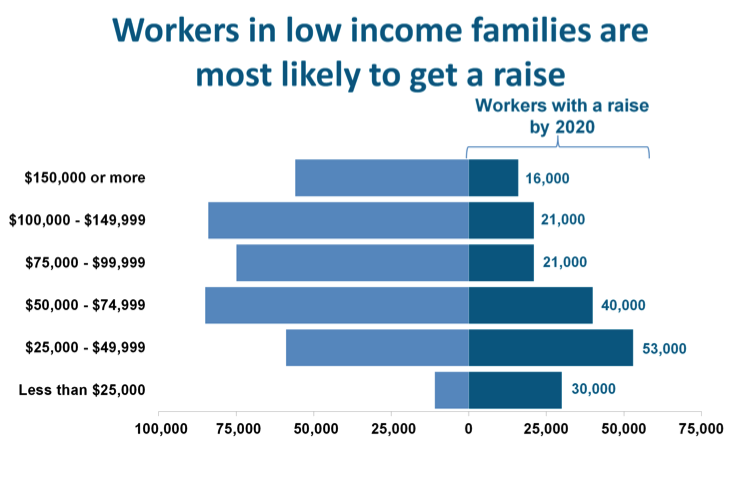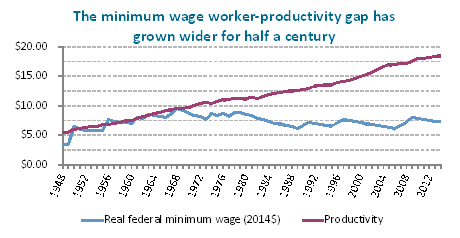In 2020 181,000 Mainers will earn an additional $3,485 a year on average; 9 of 10 of those benefiting are age 20 or older, half between age 20 and 39
Augusta, Maine (Wednesday, August 17, 2016) The Maine Center for Economic Policy (MECEP) today released a new report, Restoring the Value of Work, which analyzes the impacts the proposal to raise the minimum wage incrementally to $12 an hour by 2020 will have have on Maine workers, families, businesses, and economy.
“Our analysis found that a $12 minimum wage will increase worker earnings, boost spending in the local economy, improve business productivity, enhance children’s’ prospects, and reduce the need for public assistance,” said MECEP Executive Director Garrett Martin. “It will have a positive impact on workers, businesses, and Maine families, strengthening Maine’s economy. It will raise wages for one-third of Maine’s workforce and improve economic security for these workers and their families.”
The report’s findings include:
- Raising the minimum wage to $12 an hour by 2020 will increase the pay for 181,000 Maine workers- one in three of all Maine workers -by $3,485 more on average. This includes tipped workers, who will reach the $12 minimum wage by 2026.
- Nine out of ten workers getting a raise are age 20 or older, half are between 20 and 39. Forty-nine percent of those who will get a raise are men, 51 percent are women.
- One in three Maine seniors who work will get a raise. Wage income accounts for nearly 60 percent of senior income in Maine.
- Higher wages will increase worker performance, morale, health, and customer service and reduce employee absenteeism and worker grievances. It will lead to higher productivity, increased workplace efficiency, greater customer satisfaction, and lower operational and labor costs.
- Improved productivity will offset increased minimum wage costs and, as a result, Maine is unlikely to experience a net loss of jobs from the minimum wage increase.
- One in four of those workers who will get a raise supports at least one child. A $3,000 increase in income for households earning less than $25,000 a year will increase by 17 percent the lifetime earnings for a child in the home age five or under. By boosting the earnings of families with young children, raising the minimum wage will have a transformative effect on future generations of Mainers.
- Raising the minimum wage will decrease the likelihood of low-wage Maine workers receiving public assistance by 6.9 percentage points, allowing the state to target limited resources toward transitioning more Mainers into full-time work, better serving Mainers and their families who are unable to work, and saving taxpayer funds.
The report also finds that increasing the minimum wage will raise wages for 64 percent of Maine workers- nearly two out of three -who live in households in poverty and 60 percent of Maine workers living in households near poverty. An individual working a year-round, full-time job at minimum wage earns just $15,600, less than the federal poverty level for a family of two.
The report notes that for nearly four decades the minimum wage kept pace with worker productivity, ensuring that standards of living for low-wage workers increased as the economy grew, but this link between productivity and wages has been broken for the past 50 years. Today’s workers, who are more educated and more productive than ever before, no longer realize the full value of their contributions to our economy. In Maine where the state’s minimum wage does not automatically increase with the cost of living, today’s minimum wage has less purchasing power than it did in 1968.
“Mainers are working harder than ever, have less to show for it, and struggle from paycheck to paycheck to make ends meet,” report author Sarah Austin writes. “Their wages are stagnant. Many cannot afford to purchase health care, send themselves or their children to college, or save for retirement. Nearly 50,000 Mainers work more than one job to support their families. One of every three Maine families falls below 200 percent of the federal poverty line, unable to pay for their basic needs. Over 145,000 Maine workers-more than a fourth of the state’s workforce-work in low-wage jobs. Increasing Maine’s minimum wage is a vitally important step toward addressing all of these issues.”
“Maine’s ballot initiative to raise the minimum wage to $12 an hour by 2020 makes sense,” Martin added. “Ensuring that more hardworking Mainers earn enough to make ends meet is also the fair thing, the right thing to do. The minimum wage ballot initiative will restore the value of hard work and is a wise investment in Maine’s future.”
For a PDF of the full study: Restoring the Value of Work
Restoring the Value of Work is available on MECEP’s website.
For a copy of the full report, click here.
For a copy of the report’s executive summary, click here.




